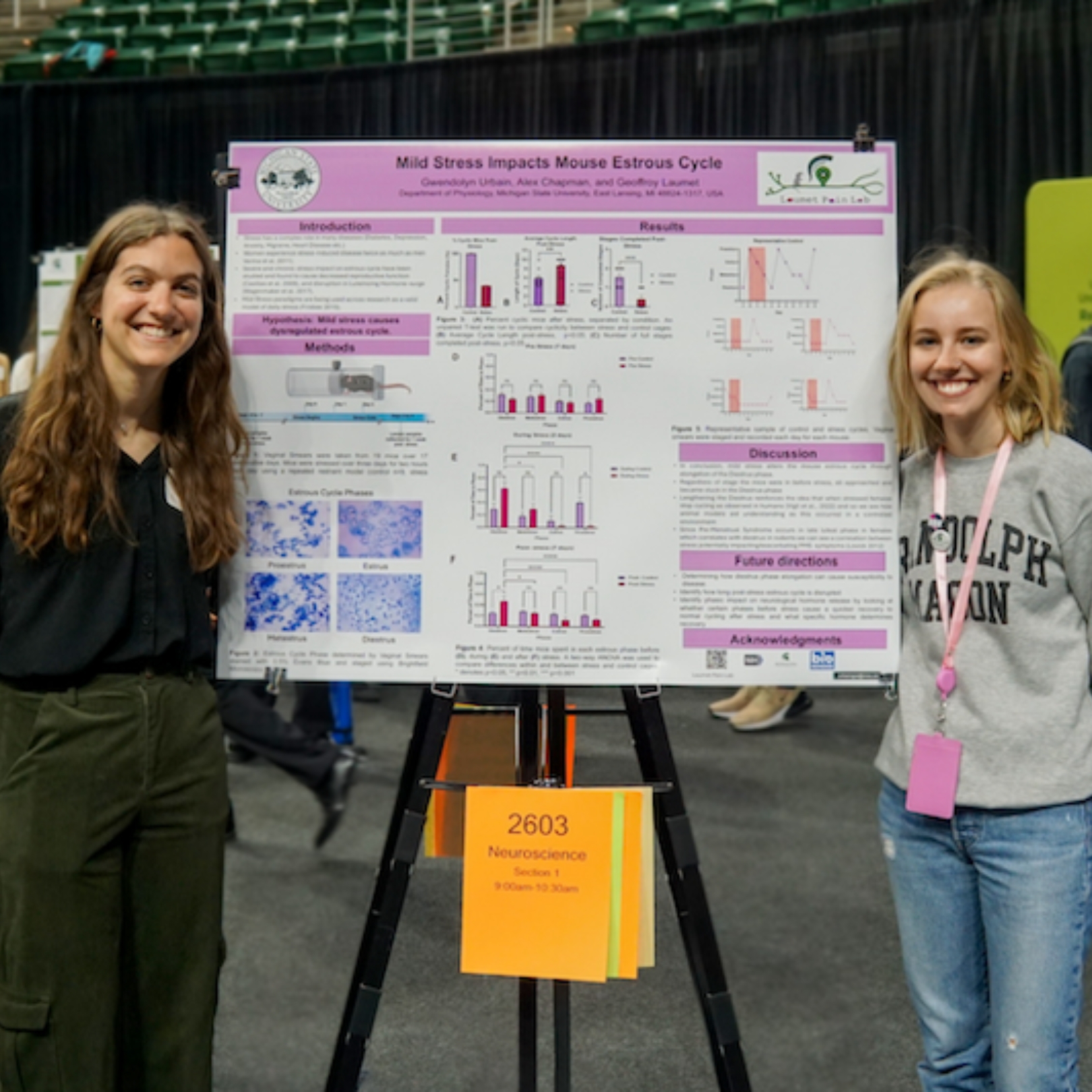Recent neuroscience graduate wins grand prize at UURAF
Gwendolyn Urbain's Study Links Mild Stress to Disrupted Female Reproductive Cycles
Article Highlights
- Gwendolyn Urbain, a recent MSU neuroscience graduate, won the Grand Prize at the 27th annual UURAF.
- Urbain is the third student from the Department of Physiology in four years to win the Grand Prize at UURAF.
- Her award-winning study, “Mild Stress Alters Mouse Estrous Cycle,” revealed that even
mild stress disrupts female reproductive cycles, highlighting potential impacts on
fertility and women’s health.

Gwendolyn Urbain won the grand prize for her study on how mild stress disrupts the reproductive cycle in female mice during the 27th annual UURAF event. Credit: T. Lee
For the third time in four years, a student from Michigan State University’s Department of Physiology has won the Grand Prize at the annual University Undergraduate Research and Arts Forum (UURAF). Gwendolyn Urbain earned top honors in the Science, Technology, Engineering, and Mathematics category for her study on how mild stress disrupts the reproductive cycle in female mice during the 27th annual UURAF event this past April.
Her win follows previous Grand Prize recipients Hariharan Ramakrishnan (2022) and Harrison Nabors (2023), adding to the department’s growing legacy of undergraduate research excellence and commitment to mentorship.
“It feels really special to be part of this legacy of UURAF Grand Prize winners,”
said Urbain who recently graduated with a degree in neuroscience. “Personally, the
recognition of the effort and time I spent on this research means so much. It gives
me a lot of belief in myself and inspires me to keep digging into research that interests
me.”
Her award-winning project, “Mild Stress Alters Mouse Estrous Cycle,” investigated
how restraint stress affects female reproductive cycles. Over 17 days, Urbain observed
nineteen mice and tracked their reproductive cycles. She found that even mild stress
disrupted normal cycling and pointed to potential effects on fertility and overall
reproductive function.

“This work highlights the need to further explore how everyday stressors may subtly impair reproductive health,” Urbain said.
Her research also ties into larger questions in women’s health and may help explain sex differences in conditions like chronic migraine, a central focus of her mentor Geoffroy Laumet’s lab, which Urbain joined in January 2024 as an undergraduate assistant. Laumet also mentored Ramakrishnan.
Laumet says that Urbain’s project connects to timely global concerns about fertility and reproductive health, which are declining across many countries. He adds that while many factors contribute to this trend, daily stress is increasingly recognized as a potential driver.
“Gwen’s work addressed this issue from a biological perspective using a controlled animal model that isolates environmental influences from socio-cultural ones,” Laumet said. “Her findings clearly show that mild stress disrupts the estrous cycle in female mice, thereby impairing reproductive function.”
Urbain also conducted the project with guidance from graduate student and lab mate Alexandra Chapman, who taught her lab techniques while encouraging independent thinking.

“My primary role was to show her how to do the techniques and answer questions when needed but she became very independent in this project very quickly,” said Chapman, a third-year Ph.D. candidate in the Neuroscience Program at MSU. “To me, this award reassured what I already knew; she is a great student who will one day make an amazing scientist.”
Urbain is currently working on a manuscript to publish her findings while exploring graduate programs to continue studying female neurophysiology, particularly reproductive health in the context of exercise.
“This research is important to me as a woman and an athlete,” she said. “I think understanding female physiology is important to fully know how far the female body can be pushed for athletic performance. By identifying how stress is dysregulating the female cycle, we can find ways to mitigate its effect so that women can perform at a high level without needing to worry about adverse health effects.”
- Categories:



